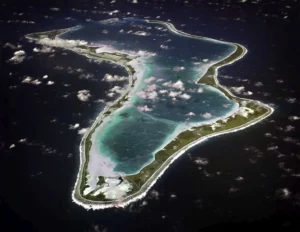
The sun will finally set on the British Empire, reportedly heavily due to President Joe Biden’s pressure on British Prime Minister Keir Starmer.
According to the Telegraph, Biden administration officials told their British counterparts that a refusal to give up the Chagos Islands in the Indian Sea would jeopardize the U.S.-U.K. “special relationship.” A deal was reached with Mauritius last week to transfer sovereignty of the British territory, one of the last of the United Kingdom’s possessions in the Indo-Pacific region. On March 21, 2025, the old adage that the “sun never sets on the British Empire” will no longer be true, as the sun will set on all of the U.K.’s territorial possessions for the first time in more than 200 years.

The Chagos Islands are an archipelago of more than 1,000 small islands, the biggest of which is Diego Garcia. The native inhabitants were removed in the 1960s and 1970s — its only current inhabitants are British and American personnel. It serves as one of the most strategically important territories for the U.S. and the U.K., as its airfield allows bombers to hit targets in the Middle East and Indo-Pacific.
The Biden administration pressured the incoming Labour Party government to accept a deal over fears that Mauritius would win its application for a binding ruling at the International Court of Justice to take control of the islands, the outlet reported, effectively shuttering the key air base.
Justifying the ceding of the islands, Foreign Secretary David Lammy told members of Parliament that their legal situation regarding the islands was “unsustainable.”
The Telegraph also reported that Biden administration officials pressured their counterparts to accept a deal before the U.S. election next month.
As part of the deal pushed by the Biden administration, the U.S. and the U.K. will rent out the joint military base for 99 years. The full details of the agreement, such as how the problem of Chinese influence will be dealt with, were not made public. The primary concern for the U.K. and the U.S. is the closeness of Mauritius with China.
The deal was an immense source of controversy at home and has been widely denounced by British conservatives and nationalists alike.
In an editorial, the conservative Telegraph decried the deal as a “national scandal.” It argued that the move would embolden Argentina and Spain to take over the Falkland Islands and Gibraltar, respectively.
Starmer did not immediately assuage those concerns, but after backlash, he affirmed that changing the status of either was out of the question.
British lawmaker Nigel Farage, a close ally of Trump, caught on to the U.S. election connection during a debate in Parliament.
National sovereignty is more important than an obscure foreign court. The surrender of the Chagos Islands is a strategic disaster. pic.twitter.com/doMJk5OH6e
— Nigel Farage MP (@Nigel_Farage) October 7, 2024
“You boast that President Biden likes this deal,” Farage told Lammy. “Now, the speaker earlier on said that this House should not be affected by elections that take place in foreign countries. But I wonder: How confident are you if the 47th president of the USA becomes Donald Trump, that he would approve of this deal, given the importance of our relationship with America”
CLICK HERE TO READ MORE FROM THE WASHINGTON EXAMINER
The term “an empire on which the sun never sets” was first used to describe the Habsburg Empire in the 16th century, which, under Charles V, became the world’s first global empire. It later became more commonly used to describe the then-dominant British Empire in the 19th and early 20th centuries. At its peak in 1920, it covered nearly a quarter of the globe’s land mass.
The adage of an empire on which the sun never sets still applies to the French Republic, with small possessions across the planet.







